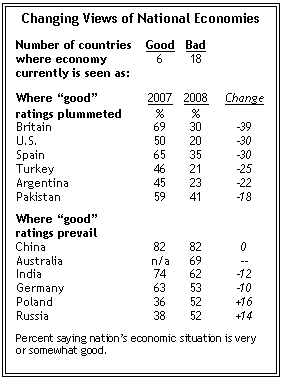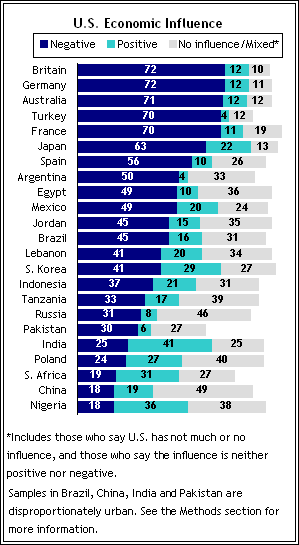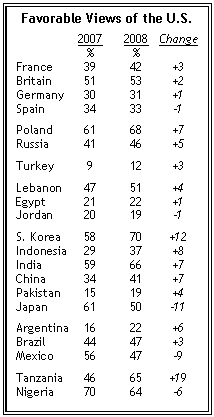Overview
Five years after the start of the war in Iraq, the image of the United States abroad remains far less positive than it was before the war and at the beginning of the century. However, the latest survey by the Pew Global Attitudes Project finds some encouraging signs for America’s global image for the first time this decade.
Favorable views of the United States have increased modestly since 2007 in 10 of 21 countries where comparative data are available. Perhaps more importantly, the polling finds many people around the world paying close attention to the U.S. presidential election. Moreover – except in countries that are extremely anti-American – those who are paying attention generally believe the next president may well change U.S. foreign policy for the better. In nearly every country surveyed, greater numbers express confidence in presidential candidate Barack Obama than in John McCain.

However, the survey of more than 24,000 people in 24 countries, conducted March 17 to April 21, finds another change in global opinion that could present a formidable challenge to the United States in the future. Around the world, people have a new concern: slumping economic conditions. And they have a familiar complaint – most think the U.S. is having a considerable influence on their economy, and it is largely seen as a negative one.
Majorities in 18 of the 24 countries surveyed describe current economic conditions in their country as bad. Assessments have worsened over the past year among countries surveyed in both this year and 2007. The median percentage rating their national economy as bad rose from 50% in 2007 to 61% in the current poll. The proportion of respondents expressing a positive view of their nation’s economy has declined in 14 of the 22 countries since last year.
The publics of two emerging Asian superpowers – China and India – remain upbeat about national economic conditions, though Indians are less positive than they were a year ago. In contrast, some of the most negative evaluations of economic conditions come from citizens of advanced Western countries. Positive views of the economy have declined sharply over the past year in Great Britain, the United States and Spain. France, where most people were already quite negative about the economy, registered a further decline; in the current survey, just 19% of the French view the national economy as good, down from 30% in 2007.
While American and Chinese publics are at opposite poles with the respect to opinions about their national economies, the new Global Attitudes survey finds growing symmetry in the way that the United States and China are viewed by people all around the world. Overall, favorable ratings of the two countries are fairly comparable as China’s image has slipped a bit and the U.S. image, if anything, has improved slightly. Both the United States and China are widely viewed as taking a unilateralist approach in their relations with other nations, while at the same time both are seen as having considerable influence on other countries. And as global warming is of increasing importance to the citizens of the world, both the U.S, and China are criticized for the way they deal with environmental problems.
Blaming the United States

Large majorities in countries ranging from economically advanced Great Britain and Germany to developing nations such as Egypt and Indonesia say that what happens in the American economy affects economic conditions in their own countries. With only a few exceptions, the American economy is now seen as having a negative impact on national economies, both large and small, in all parts of the world.
The view that the American economy is hurting their national economies is most prevalent among the publics of Western Europe. About seven-in-ten in Great Britain, Germany (72% each) and France (70%) say that the U.S. economy is having a negative impact on economic conditions in their country. India and Nigeria are the only nations surveyed where more than a third of respondents express a positive view of America’s economic influence.
U.S. Favorability Edges Up

Despite these economic concerns, there is little evidence that the overall image of the United States has slipped further as a consequence. In fact, positive views of the United States have risen sharply in Tanzania (by 19 points) and South Korea (12 points), and by smaller but significant margins in Indonesia, China, India and Poland. Overall, opinions of the United States are most positive in South Korea, Poland, India and in the three African countries surveyed this year – Tanzania, Nigeria and South Africa.
However, positive opinions of the United States have declined by 11 points in Japan – a traditional U.S. ally – and in neighboring Mexico (by nine points). The image of the United States also remains overwhelmingly negative in most of the predominantly Muslim countries surveyed, though no more so than in recent years.
Fewer than a quarter of respondents express positive opinions of the United States in Egypt (22%), Jordan (19%), Pakistan (19%) and Turkey (12%). Large majorities in Turkey and Pakistan say they think of the United States as “more of an enemy” rather than as “more of a friend” (70% in Turkey; 60% in Pakistan). In Lebanon, 80% of Shia Muslims consider the United States to be more of an enemy.
As in recent years, favorable views of the United States remain fairly low among the publics of a number of its traditional Western European allies. Solid majorities continue to express unfavorable opinions of the U.S. in France, Germany and Spain. Great Britain is the only country – of four Western European nations surveyed – where a majority (53%) expresses a positive view of the U.S.
Next American President
The survey also finds a widespread belief that U.S. foreign policy “will change for the better” after the inauguration of a new American president next year. Among people who have been following the election, large majorities in France (68%), Spain (67%) and Germany (64%) say that they believe that U.S. foreign policy will improve after the election. This sentiment is also common in the African countries included in the survey – Nigeria (67%), South Africa (66%) and Tanzania (65%).

Yet this belief is far from universal. In Jordan and Egypt, more people who are following the election say they expect new leadership to change U.S. foreign policy for the worse than say they expect a change for the better. Two-thirds of the Japanese (67%) who are following the election say it will not bring about much change in U.S. foreign policy. That is the plurality opinion in Russia and Turkey as well.
There is considerable interest in the presidential campaign in the surveyed countries. A large majority of Japanese say they are following the election very closely (24%) or somewhat closely (59%). As a point of comparison, a third of Americans are following the election very closely, with another 47% saying they are tracking the campaign somewhat closely.
At least half or more of respondents in such countries as Germany, Australia, Great Britain and Jordan are closely following the election. There is less interest in the election in many other countries, including France, where 40% are focusing on the campaign, Mexico (33%) and Spain (25%).
People around the world who have been paying attention to the American election express more confidence in Barack Obama than in John McCain to do the right thing regarding world affairs. McCain is rated lower than Obama in every country surveyed, except for the United States where his rating matches Obama’s, as well as in Jordan and Pakistan where few people have confidence in either candidate.
Obama’s advantage over McCain is overwhelming in the Western European countries surveyed: Fully 84% of the French who have been following the election say they have confidence in Obama to do the right thing regarding world affairs, compared with 33% who say that about McCain. The differences in ratings for Obama and McCain are about as large in Spain and Germany, and are only somewhat narrower in Great Britain.
China Under the Microscope

With global attention focused on China in anticipation of the Beijing Olympics, people around the world express considerable concern about Chinese policies and the impact that China is having on their own countries and lives. China is faulted for a unilateral approach in its dealings with other countries and for not respecting human rights at home. And it is increasingly seen as hurting the global environment at a time when concerns about global warming run very high and have increased in many countries.
The verdict is more mixed with regard to China’s growing economic power and the impact it is having on the well being of other nations. China is a consistent worry to the publics of most Western nations, as well as to the South Koreans, but the publics of other Asian nations, including the Japanese, Indonesians and Pakistanis generally see increasing Chinese economic power as a good thing. And the publics of African nations, in particular Nigeria and Tanzania, are most likely to look favorably upon China’s burgeoning economic impact and influence.
Overall the current survey, which was conducted at a time when China was coming under harsh criticism for its crackdown on political dissent in Tibet, once again finds favorable ratings of China slipping in many countries. Positive views fell significantly in nine of 21 countries in which polls were taken in 2007, as well as in the current survey. Opinions of China tumbled the most in France (47% to 28%) and in Japan (29% to 14%). Favorable ratings of China are highest in Nigeria, Pakistan, Tanzania and Russia.
Despite growing anti-Chinese sentiment, people in most countries surveyed approve of the decision to hold the Olympics in Beijing. In 14 of 23 countries, clear majorities favor the idea. Dissenters are most prevalent in Japan (55%), France (55%), Germany (47%) and the U.S. (43%).
Advocates of the Olympics decision are most often found in neighboring Asian nations India, Indonesia, Pakistan and South Korea. But many people in African and Latin American nations that have strong economic ties to China, including Nigeria (79%), Argentina (72%), Mexico (67%) and Brazil (76%), are also overwhelmingly enthusiastic about the decision.

The new survey finds that global views of China and the U.S. are parallel in many respects. First, there is parity in the worldwide images of the two nations. The survey found the publics of nine countries holding a more favorable view of the U.S. than China, which was matched by 10 countries where there is a more favorable view of China. (In three countries, publics had an equally favorable view of the U.S. and China.)
In Asia, the U.S. is much better rated than China by the Indians and the South Koreans. But, the Chinese image far outshines the U.S. image among Indonesians, Pakistanis and Russians. In Western Europe, the British, French, and Germans rate both the U.S. and the American people more positively than they do China and the Chinese people.
As with the United States, people around the world are critical of China for not taking into account the interests of other countries in the formulation of international policies. Criticisms of Chinese unilateralism are particularly prevalent in neighboring Japan and South Korea.
Also paralleling opinion of the United States, many people around the world think that China has a direct bearing on how things are going in their country. This view is especially prevalent among Asian publics, as well as those of leading Western powers: Fully 86% of Japanese respondents think that China has a significant amount of influence on the way things are going in their country, a view shared by 76% of the American public. Somewhat smaller majorities in France, Germany and Great Britain concur.
However, large majorities of the publics of two of the three African nations included in the survey are also of the view that China has an impact on their respective countries – 70% of Nigerians and 63% of South Africans believe that China has a bearing on the course of their nations. But, for the most part, African publics, unlike most people in other parts of the world, think that China’s influence is positive. For example, 85% of Nigerians who think China is having an influence on their country believe its impact is a good one, while only 22% of the British hold the same view.
Human Rights Concerns
One continuing advantage for the U.S. over China is that large majorities of people in most countries are critical of China for not respecting the personal freedoms of its people. By contrast, for the most part, the U.S. is seen as mindful of the rights of its citizens. Overwhelming numbers of people in Western countries are critical of China in this regard, rating it as negatively as Iran in terms of respect for human rights. Only in Nigeria, Pakistan, Tanzania and Indonesia do most people think well of China’s concern for personal freedoms.
Closer to the lives of people all around the world, respondents in most countries say they think that products made in China are less safe than products made in other countries. Majorities of respondents in 18 of 24 countries expressed concerns about Chinese exports.
Yet, for all the criticisms of China with respect to how it operates both at home and abroad, there is little public alarm. China is not seen as an enemy by the vast majority of people in the countries surveyed. Even in Japan where views about China are highly unfavorable, only 23% of respondents describe China as an enemy. Indeed, China is more often thought of as a partner in Africa – majorities in Nigeria (78%), Tanzania (74%) and South Africa (53%) express this view.
Additional Findings
- Support for international trade continues to decline in the United States – 53% of Americans say trade is good for their country, down from 59% last year and 78% in 2002. Support for trade is lower in the U.S. than in any other country included in the survey.
- The survey finds little optimism about the likelihood of success in Iraq. Americans are much less optimistic than they were two years ago – 40% now say efforts to establish a stable democratic Iraqi government will succeed, down from 54% in 2006. However, optimism has increased slightly in both Egypt (32% in 2006, 41% now) and Jordan (34% in 2006, 41% now).
- Majorities or pluralities in 21 of 24 countries want the U.S. and NATO to remove their troops from Afghanistan as soon as possible. However, public opinion in the U.S., Great Britain and Australia – all of which have a military presence in Afghanistan – leans toward keeping troops there until the situation has stabilized.
- In 22 of 24 countries, the U.S. is most commonly identified as the world’s leading economic power. Pluralities in Germany and Australia, however, name China.
- Western European publics are more likely than China’s Asian neighbors to believe China will ultimately replace the United States as the world’s leading superpower. Most Chinese think their country either has already supplanted the U.S. (5%) or will eventually do so (53%).
- Asian publics generally have favorable views of both Japan and India, although neither country fares so well among its traditional rivals. Only 21% of Chinese have a positive opinion of Japan and just 27% of Pakistanis hold a favorable view of India.
- As he nears the end of his second term, U.S. President George W. Bush continues to receive negative reviews from international publics. In 14 of 24 countries, two-thirds or more of respondents express little or no confidence in him to do the right thing in world affairs.
- In the U.S., just 37% voice confidence in Bush, that compares to 78% in May 2003, just months after the beginning of the Iraq war.
- Views of French President Nicholas Sarkozy are mixed, both inside and outside Europe. Among the French themselves, 51% have a lot or some confidence in their president to do the right thing in foreign policy, while 49% have little or no confidence. However, the French hold decidedly positive views of Angela Merkel – 84% have confidence in the German Chancellor. This is similar to 2006, when the French held Merkel in much higher regard than Sarkozy’s predecessor Jacques Chirac.
- Merkel also receives high marks from her fellow Germans – 76% have confidence in her. Of the three European leaders assessed on the survey – Merkel, Sarkozy and Russia’s Vladimir Putin – Merkel generally receives the highest ratings from global publics.
- The U.S. is blamed more often than any other country for harming the world’s environment, although concerns about China’s environmental record are on the rise as well – the view that China is most to blame is up significantly in 13 of 20 countries.




